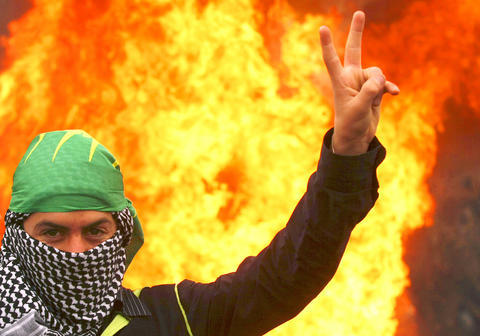A third day of unrest in the Kurdish region of southeast Turkey on Sunday left two people dead and two police officers injured, officials and witnesses said on Sunday.
Violence erupted when celebrations to mark March 21 -- Nowruz Day, or the Kurdish new year -- degenerated into protests in favor of separatist Kurdish rebels and the authorities banned gatherings in some cities.
A 20-year-old man died from a bullet wound in Yuksekova town, where riot police clashed with hundreds of protestors who took to the streets in defiance of the ban, hospital sources said.

PHOTO: AP
Two policemen were slightly injured when a bomb, believed to be a small device designed to make loud noise rather than to kill, exploded in the street as the security forces chased protesters, witnesses said.
At least five demonstrators and another policeman were injured, as police fired warning shots in the air and used tear gas and water cannon on the crowd.
Shouting slogans in favor of the separatist Kurdistan Workers' Party (PKK), masked youths hurled stones at the security forces, set barricades and fires in the street and broke shop windows.
Police blamed the unrest on the Kurdish Democratic Society Party (DTP), which organized the gathering despite a decision by local authorities to allow the celebrations only on Friday.
Dozens of people, including police officers, have been injured and more than 300 rounded up across Turkey since Friday when the disturbances began after initially peaceful celebrations.
Violence also erupted on Sunday in the western city of Izmir, home to a large Kurdish migrant community from the southeast, and 20 people were detained, Anatolia news agency reported.
The demonstrators attacked police with chunks of concrete that they dismantled from the pavement, breaking also the windows of buildings and cars, the agency said.
The DTP provincial chairman in Izmir was detained on Saturday after allegedly calling for a "Nowruz rebellion," along with several other people who were in the procession throwing Molotov cocktails.
The largest Nowruz gathering on Sunday took place under tight security in Istanbul and was largely peaceful.
Thousands of people danced, sang and waved flags of green, yellow and red -- the traditional Kurdish colors -- as police helicopters overflew the event.
Police detained 14 people who brandished portraits of jailed PKK leader Abdullah Ocalan and chanted pro-PKK slogans, NTV TV reported.
Meanwhile, a Turkish court filed charges yesterday against the leader of a small leftist political party in a probe into a shadowy network of extreme nationalists who allegedly sought to topple the Islamic-rooted government.
The court in Istanbul charged Dogu Perincek with "being a senior official of a terrorist organization and obtaining and possessing classified documents."
Perincek is the leader of the PKK, which won a tiny fraction of the votes in general elections last summer. Last year, a Swiss court convicted Perincek of racism for denying that the mass killing of Armenians in the early 20th century was genocide.
A retired military commander and a lawyer were among those arrested earlier and reports said they were suspected of plotting to murder Turkish novelist Orhan Pamuk, who was prosecuted under a law barring insults to Turkish identity.

In the sweltering streets of Jakarta, buskers carry towering, hollow puppets and pass around a bucket for donations. Now, they fear becoming outlaws. City authorities said they would crack down on use of the sacred ondel-ondel puppets, which can stand as tall as a truck, and they are drafting legislation to remove what they view as a street nuisance. Performances featuring the puppets — originally used by Jakarta’s Betawi people to ward off evil spirits — would be allowed only at set events. The ban could leave many ondel-ondel buskers in Jakarta jobless. “I am confused and anxious. I fear getting raided or even

Kemal Ozdemir looked up at the bare peaks of Mount Cilo in Turkey’s Kurdish majority southeast. “There were glaciers 10 years ago,” he recalled under a cloudless sky. A mountain guide for 15 years, Ozdemir then turned toward the torrent carrying dozens of blocks of ice below a slope covered with grass and rocks — a sign of glacier loss being exacerbated by global warming. “You can see that there are quite a few pieces of glacier in the water right now ... the reason why the waterfalls flow lushly actually shows us how fast the ice is melting,” he said.

Eleven people, including a former minister, were arrested in Serbia on Friday over a train station disaster in which 16 people died. The concrete canopy of the newly renovated station in the northern city of Novi Sad collapsed on Nov. 1, 2024 in a disaster widely blamed on corruption and poor oversight. It sparked a wave of student-led protests and led to the resignation of then-Serbian prime minister Milos Vucevic and the fall of his government. The public prosecutor’s office in Novi Sad opened an investigation into the accident and deaths. In February, the public prosecutor’s office for organized crime opened another probe into

RISING RACISM: A Japanese group called on China to assure safety in the country, while the Chinese embassy in Tokyo urged action against a ‘surge in xenophobia’ A Japanese woman living in China was attacked and injured by a man in a subway station in Suzhou, China, Japanese media said, hours after two Chinese men were seriously injured in violence in Tokyo. The attacks on Thursday raised concern about xenophobic sentiment in China and Japan that have been blamed for assaults in both countries. It was the third attack involving Japanese living in China since last year. In the two previous cases in China, Chinese authorities have insisted they were isolated incidents. Japanese broadcaster NHK did not identify the woman injured in Suzhou by name, but, citing the Japanese